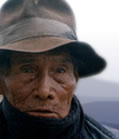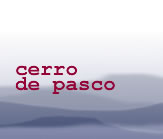 |
 |
||
 |
|||
|
RELATED THEMES community activities culture and customs education employment and income gender migration OTHER LOCAL THEMES BACKGROUND |
social change
The increasing migration of young people away from Cerro de Pasco is changing the social fabric of the region. Many of those left behind are the elderly, some of whom feel deeply saddened at the breaking up of families. One woman says: "Our life isn't important to anyone, despite the fact that we produce meat for them, beans, potatoes, maca and other things that they eat in the city. Before it was different. People stayed here. Not now. They go to study and work in the city. So we remain here alone" (Peru 6). One man feels that migrants almost have to cut ties with their old lives, because of the sadness of having had no choice but to leave their communities: ".there have been a lot of comuneros who've given up. More have emigrated to the city of Lima. they've forgotten that they are comuneros. They do whatever they can, except for what they know, and in that way they forget their land, they have to forget" (Peru 10). "Many come back," he says, "but that doesn't mean to live; they return to visit, to look around, to come and see their families." Migration brought social change in the past too, of course, when the flow was in the other direction. People were attracted to mining jobs and came from other communities, cultures, even countries. Several narrators remark on the vibrant mix of culture and music that the influx of "foreigners" brought to La Oroya in particular. Today, it seems, festivals and other traditional customs continue to play an important role in society, with many migrants returning home to join in the celebrations - but rural depopulation remains a fact of life. The mining industry brought a different way of working. One woman points out: "The campesino doesn't have holidays like employed people, like the miners for example, and nothing's fixed - there's basically no timetable." (Peru5). Another man agrees: "Life in a community is always different, it's more peaceful, calmer. The timetables are different. the hours are more rigid in the mine, if it rains, thunders or even if there's an earthquake, you still have to do the hours, and if you don't do the, you're punished" (Peru 14). The introduction of a wage economy into a relatively self-contained farming population undermined some communal activities. One man recalls that when he returned to his community after 12 years working in Lima, "The solidarity of before no longer existed, like when someone goes 'let's go and do this' - there was none of that. It had been lost completely. Before it was a campesino organisation - this had all stopped. Nobody needed the faena - that was a change. [Why?] Well, [I'd say] mainly the Centromin Cobriza company where people earned money. I think [money] is like a god which nobody needs. Now the idea of 'you help me today and I'll help you tomorrow' has completely gone" (Peru 8). The pollution from the mines also had a social cost: "There are things that are no longer customary around here, for example.the faenas (communal work) of the women washing their clothes on Sundays.[this doesn't happen] nowadays, no, because no one wants to wash their clothes in the river - the river is pure filth" (Peru 3). Attitudes to marriage have changed a little: many older people feel there is less formality both in courtship and over the decision to marry. Some feel this to women's disadvantage: ".young people are more independent now and they sometimes don't like to honour their commitments. You see that more now, single mothers with children left to their destiny. You didn't see much of that before, it's more common now, young men don't want to honour their commitments and they just leave the women with their children" (Peru 28). quotes about social change"The communities are becoming quite frankly, just full of old people, that's all. The young people go to the cities. you'll find nearly 70 per cent of our community outside.in Lima, others in Huancayo, others in Chanchamayo. Yes, they return, but they forget. when they get a little bit of money they forget about their community, frankly, they become more like foreigners or people from the coast. It's very strange... and it's not just here. It seems to be the same in every community. People come back different and there are very few of us [left in the community] who want any kind of development." "[Before] people only married between members of the community and the husband had to have land and cattle to be able to ask for a girl's hand. Now people pair up more easily with strangers. Men come to look for women and they take them away, though there are still marriages between Quiulacochans as well. Some people go to the city and get married there. It's not like before anymore. Before people didn't go out of their communities as often." "In the past there were customs [about marriage] but not any more. Most young people in Cerro de Pasco get married after a period of courtship. Then they formalise their commitment and after a while they get married, it's nearly always Catholic [wedding] with a party. Young people don't marry so young these days, that has changed.most of them are over 25 when they get married.They used to get married young because that was the way our elders used to do it, and the custom was to arrange the marriage. That means that the parents of the lad and the girl would make the match and this had to be obeyed.We don't do this any more in Rancas and I think it's a thing of the past." "For me this change [to working in the mine] meant an almost total loss of freedom to travel around my own community, to go to other towns. You.are always in the grip of time. You have to start work at a certain time and finish at a certain time. they squeeze the juice out of you, you sweat like crazy and come out exhausted. there's no more freedom, you have no strength left. You go to town once a week.and the rest of the time you are completely exhausted. you're practically enslaved. But when I was a student, when I was a campesino. I was free to wander here, there, all over the place. Although things were hard, I didn't have any money, at least I was free to move around." |
|